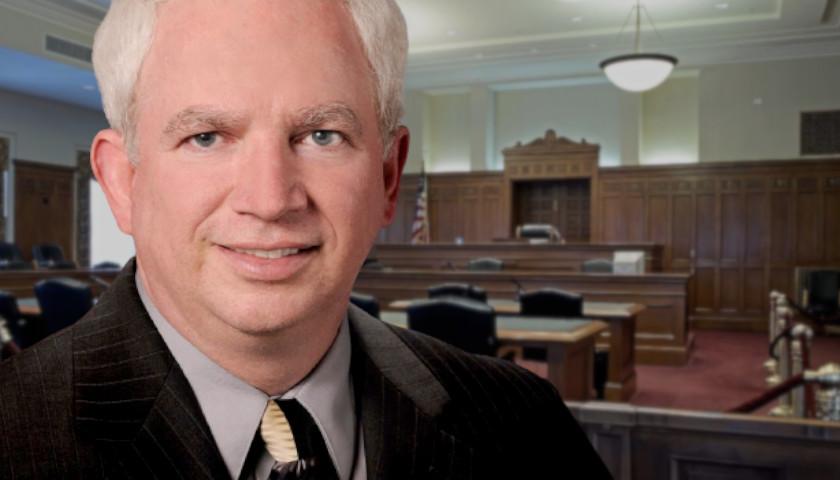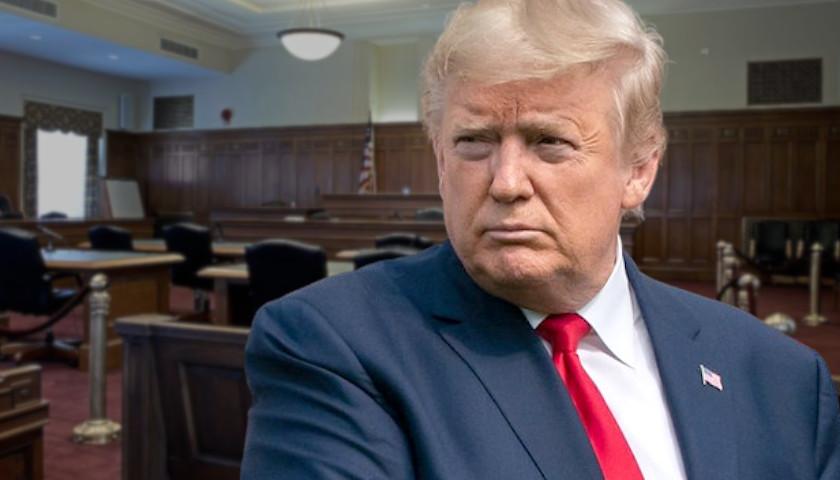The second week of the disbarment trial of Trump attorney and constitutional scholar John Eastman concluded Friday, with testimony from the State Bar of California’s (SBC) expert witnesses Justin Grimmer and Jonathan Brater, director of the Michigan Bureau of Elections (MBE). Grimmer is a political science professor at Stanford.
Much of SBC attorney Duncan Carling’s questions to Grimmer consisted of asking him to debunk claims of election fraud, prompting First Amendment attorney Mark Fitzgibbons to tweet, “Am I wrong, but isn’t this bizarre CA Bar trial of Trump lawyer Dr John Eastman hearing more evidence than all the pre-Jan 6 election litigation challenges combined?” Analyzing election fraud claims did not come up in the 2020 election cases since the judges dismissed them on technicalities without getting to the merits.
Am I wrong, but isn’t this bizarre CA Bar trial of Trump lawyer Dr John Eastman hearing more evidence than all the pre-Jan 6 election litigation challenges combined?
— Mark Fitzgibbons (@MarkFitzgibbons) June 30, 2023
Carling asked Grimmer about accusations that signature verification standards were loosened up in Pennsylvania prior to the 2020 election, allowing ballots to be accepted that should not have been. Grimmer claimed that the increase in ballots was due to a 2019 law that went into effect allowing for curing of ballots, but admitted that he had no idea what percentage of ballots were rejected in Pennsylvania due to changing the signature verification standards.
Grimmer dismissed accusations of felons and dead people voting by claiming that they had been misidentified by election investigators. He said those who cited them confused their names and birth dates with eligible voters. However, he provided no numbers or percentages of the ones he’d looked into.
Carling asked Grimmer about election investigator Bryan Geels’ finding that over 86,000 voters who voted in Georgia’s 2020 election were added to the voter rolls before 2016 but didn’t show up in the 2016 voter registration database. Grimmer excused them all away as either “clerical errors” or people who had moved.
Grimmer was dismissive of the thousands of voters who complained about being disenfranchised or other election anomalies, derogatorily referring to the stories as mere “anecdotes.” He picked two complaints and explained how there must not have been any fraud. One involved a Georgia woman who discovered when she went to vote in person that someone had already voted her early ballot for her. Grimmer said this wasn’t an issue since she was allowed to cast a ballot that overrode the earlier vote. He did not discuss what would have happened had she decided not to vote.
 The second incident involved a woman complaining that her deceased husband’s voter registration had become active. Grimmer said it wasn’t an issue because someone had stolen the man’s identity after he died, then went to the Georgia Department of Motor Vehicles (GMVD) to conduct some business. Since the state has an automatic motor voter law, the GMVD automatically registered her late husband to vote. Grimmer did not express any concern that this type of activity would allow identity thieves to vote or that it might indicate that motor voter flaws are flawed.
The second incident involved a woman complaining that her deceased husband’s voter registration had become active. Grimmer said it wasn’t an issue because someone had stolen the man’s identity after he died, then went to the Georgia Department of Motor Vehicles (GMVD) to conduct some business. Since the state has an automatic motor voter law, the GMVD automatically registered her late husband to vote. Grimmer did not express any concern that this type of activity would allow identity thieves to vote or that it might indicate that motor voter flaws are flawed.
Carling asked Grimmer why his research into election fraud was superior to experts who found fraud, such as Dr. Charles Cicchetti. Cicchetti is a Pacific Economics Group member and a former economics professor at the University of Southern California. Grimmer repeatedly asserted that his research is more logical, describing it as “basic logical analysis,” unlike the research of others.
Grimmer admitted there were many “voter irregularities” in the 2020 election but said they were only “allegations” of illegal activity, not actual illegal activity. He dismissed concerns about Georgia voters who submitted a national change of address and then voted, stating that they may have merely moved within the state.
When it was Eastman attorney Randy Miller’s turn to cross-examine Grimmer, he asked him why his reports attempting to debunk election fraud concerns focused on tweets from notable conservatives instead of serious research. He cited a tweet from Turning Point USA founder Charlie Kirk, which expressed concern that Joe Biden won far fewer counties than Donald Trump did in the 2020 election. Grimmer co-authored a report published in the National Academy of Sciences analyzing Kirk’s tweet. Miller got Grimmer to admit the tweet was unrelated to Eastman.
Miller also questioned Grimmer about his criticism of Eastman drawn from reports after the 2020 election challenges since Eastman would not have known about that information yet. When asked about underage people registering to vote in Georgia, Grimmer said it wasn’t a big deal because they probably went to the GMVD later and conducted some transaction that would have automatically updated their registration after they were of legal age.
Grimmer dismissed that many Democrats voted in Pennsylvania in 2020 compared to Republicans, stating that since it cannot be determined who each person voted for, it is an “ecological inference problem.”
Generally, when asked about election anomalies by Miller, Grimmer gave the situation the benefit of the doubt, that there was a legal explanation behind it. Miller asked about 300,000 people who allegedly applied too late to receive an absentee ballot in Georgia, and Grimmer shrugged it off, stating that most of them must have been over 65 so they could request them late.
Next, SBC counsel Samuel Beckerman called Brater to testify. Brater previously served as an attorney for the left-wing Brennan Center’s Democracy Program, where his work focused on voting rights and elections. As has become a frequent feature during the SBC’s case, Beckerman asked numerous official questions about how elections are conducted. Brater asserted that everything was performed well and there was no fraud. He explained away anomalies as clerks’ errors. He said an unprecedented level of audits was conducted but admitted that other than in one county, they were not full audits but merely randomly selecting some ballots.
Beckerman asked Brater about a lawsuit that alleged problems with the voting machine tabulators. Brater said he submitted an affidavit in the lawsuit where he refuted the complaint by pointing out that the lawsuit accused two counties of using Dominion voting machine tabulators when those counties used a different brand. He criticized the “level of seriousness” of the voters who brought the complaint, stating they have a “fundamental misunderstanding” of elections.
As for accusations that ballots were run through the tabulators multiple times, Brater explained it away as technical problems, stating that the scanner must have rejected them the first time so they were really only run through once. He dismissed the 4 percent higher turnout in Detroit in 2020 compared to 2016 by stating that it was up even higher around the rest of the state, 15 percent. However, he did not explain why so many in the state showed up to vote for Biden.
Brater admitted that his office sent out unrequested absent voter applications to registered voters in the state before the 2020 election. He defended the action by stating that the courts upheld the MBE’s authority. He also admitted that there was a significant increase in absentee ballot drop boxes placed prior to the 2020 election and said they didn’t need video surveillance. Beckerman did not ask Brater a single question about Eastman. Brater ended his testimony explaining why the office did not look into all allegations of illegal activity, “We are not a law enforcement agency.”
The trial resumes on August 22-25 and then again on September 12-15. Read the accounts from day one, day two, and day three. The trial is live streamed.
– – –
Rachel Alexander is a reporter at The Arizona Sun Times and The Star News Network. Follow Rachel on Twitter. Email tips to [email protected].





